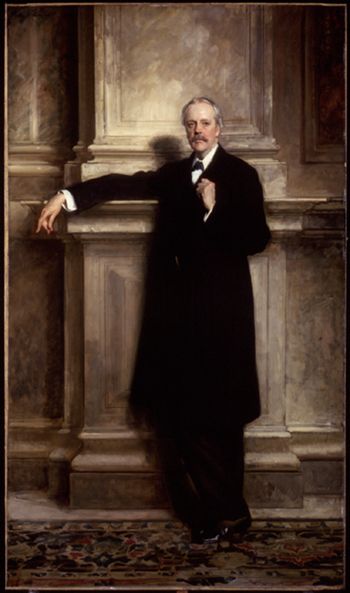 |
 |

|
From: Artfund Arthur James Balfour, 1st Earl of Balfour (Tory Prime Minister from 1902 to 1905). Balfour was one of the pivotal figures in British politics from the late 1880s to the late 1920s. In 1879, he made his mark as a philosopher, publishing A Defence of Philosophic Doubt and was the most admired of the group of young, patrician aesthetes and intellectuals known as the ‘Souls’. He entered politics in
1874 through
the patronage of his uncle, and later Conservative Prime Minster, Lord
Salisbury. He succeeded Salisbury as Prime Minster in 1902 but was
unable
to keep together a party that was divided by issues of Free Trade and
Protectionism.
He resigned in December 1905. He worked with distinction during the
First
World War, as First Lord of the Admiralty and, from 1916 to 1919, as
Foreign
Secretary. An act of far-reaching consequence was the Balfour
Declaration
of November 1917 that gave British support to ‘the establishment in
Palestine
of a home for the Jewish people’. Balfour continued in British politics
until the age of eighty, having served twenty-seven years as a member
of
the cabinet. From: telegraph.co.uk
Portrait
of Arthur Balfour is saved for the nation The Carlton Club, the spiritual home of the Conservative Party, has raised £900,000 by selling one of its most prized pieces of family silver, a portrait of Arthur Balfour, the former Tory Prime Minister, by John Singer Sargent. The Carlton, founded in 1832, is widely assumed to be one of the wealthiest London clubs but suggestions that it sold the heirloom because it is short of cash were met with silence yesterday. The painting, almost 9ft high, was bought by the National Portrait Gallery with help from supporters hours before a deadline set by the club. At least one American collector was waiting in the wings to snap it up. The painting was commissioned by club members in 1908, three years after Balfour stepped down as Prime Minister. Sargent, an American artist who had settled in Europe, was at the height of his powers at the time. For years it has dominated the club's dining room, used by generations of the Tory Party hierarchy as an alternative to the restaurants at the Palace of Westminster. The club, in St James's Street, has 1,600 full members, all men. Seventy-four women have associate status. It voted overwhelmingly last year to continue excluding women from full membership, prompting a number of resignations. Soon after, Iain Duncan Smith refused membership, an honour traditionally granted to Tory leaders, on the grounds that the club barred women. The club is believed to have portraits of every Tory Prime Minister since Disraeli. One member said yesterday: "Balfour is easily the best of the lot. It's much the largest and the most striking. Mrs Thatcher's portrait is pretty awful. It's not just chocolate box. It's milk chocolate box." Another member said he thought the Balfour portrait was being sold because of the size of the insurance premium: "They are very hefty these days and the whole collection costs an awful lot." He added that he believed a copy was being painted for the club to retain. It is believed that the club wanted the picture to go to the National Portrait Gallery but set last weekend as a deadline before selling it to an American collector who is thought to have made a higher offer. The gallery's appeal was kickstarted by the National Art Collections Fund (NACF), the country's leading art charity, with a donation of £150,000. Despite gifts from Christopher Ondaatje, the philanthropist, and a bequest from the late Lord Sieff, the NACF had to top up the appeal with a further £127,000. "It was a very dramatic
race against
time," a spokesman for the fund said. "But it was very important to
save
it because it is one of the last great full-length portraits left in
private
hands in Britain." Philip
Alexius de Laszlo Sold, July 2002, The
Carlton Club
to the National Portrait Gallery, £900,000 Special thanks to
Stamatios Kyrkos,
of Boston, MA. for letting me know about this article.
|
